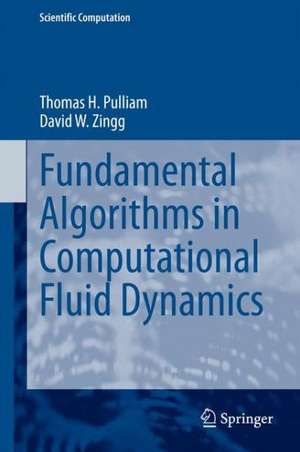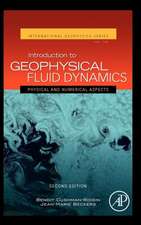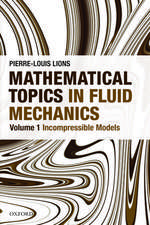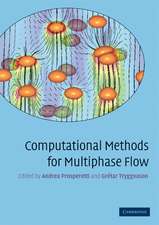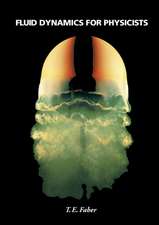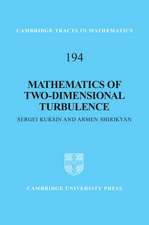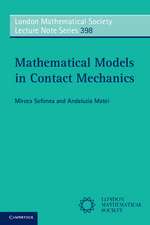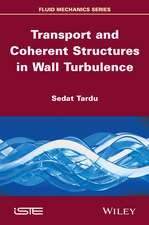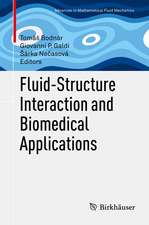Fundamental Algorithms in Computational Fluid Dynamics: Scientific Computation
Autor Thomas H. Pulliam, David W. Zinggen Limba Engleză Hardback – 10 apr 2014
| Toate formatele și edițiile | Preț | Express |
|---|---|---|
| Paperback (1) | 450.33 lei 6-8 săpt. | |
| Springer International Publishing – 3 sep 2016 | 450.33 lei 6-8 săpt. | |
| Hardback (1) | 530.10 lei 6-8 săpt. | |
| Springer International Publishing – 10 apr 2014 | 530.10 lei 6-8 săpt. |
Din seria Scientific Computation
- 18%
 Preț: 1021.05 lei
Preț: 1021.05 lei - 18%
 Preț: 743.27 lei
Preț: 743.27 lei - 18%
 Preț: 889.75 lei
Preț: 889.75 lei - 18%
 Preț: 1108.51 lei
Preț: 1108.51 lei -
 Preț: 387.96 lei
Preț: 387.96 lei - 20%
 Preț: 902.04 lei
Preț: 902.04 lei -
 Preț: 400.85 lei
Preț: 400.85 lei -
 Preț: 386.61 lei
Preț: 386.61 lei - 15%
 Preț: 654.62 lei
Preț: 654.62 lei -
 Preț: 380.25 lei
Preț: 380.25 lei - 18%
 Preț: 1111.34 lei
Preț: 1111.34 lei -
 Preț: 452.62 lei
Preț: 452.62 lei -
 Preț: 389.31 lei
Preț: 389.31 lei - 18%
 Preț: 950.03 lei
Preț: 950.03 lei - 15%
 Preț: 649.22 lei
Preț: 649.22 lei - 18%
 Preț: 787.26 lei
Preț: 787.26 lei - 18%
 Preț: 942.63 lei
Preț: 942.63 lei - 15%
 Preț: 505.18 lei
Preț: 505.18 lei -
 Preț: 389.70 lei
Preț: 389.70 lei - 15%
 Preț: 653.00 lei
Preț: 653.00 lei - 18%
 Preț: 957.44 lei
Preț: 957.44 lei - 15%
 Preț: 653.98 lei
Preț: 653.98 lei - 15%
 Preț: 643.99 lei
Preț: 643.99 lei - 15%
 Preț: 649.39 lei
Preț: 649.39 lei -
 Preț: 388.13 lei
Preț: 388.13 lei - 18%
 Preț: 958.38 lei
Preț: 958.38 lei - 18%
 Preț: 1129.52 lei
Preț: 1129.52 lei - 18%
 Preț: 967.56 lei
Preț: 967.56 lei - 15%
 Preț: 700.75 lei
Preț: 700.75 lei -
 Preț: 401.03 lei
Preț: 401.03 lei - 15%
 Preț: 597.99 lei
Preț: 597.99 lei -
 Preț: 385.62 lei
Preț: 385.62 lei -
 Preț: 394.87 lei
Preț: 394.87 lei -
 Preț: 385.08 lei
Preț: 385.08 lei - 18%
 Preț: 1106.63 lei
Preț: 1106.63 lei - 15%
 Preț: 504.17 lei
Preț: 504.17 lei - 15%
 Preț: 596.36 lei
Preț: 596.36 lei - 15%
 Preț: 653.98 lei
Preț: 653.98 lei
Preț: 530.10 lei
Preț vechi: 623.65 lei
-15% Nou
Puncte Express: 795
Preț estimativ în valută:
101.44€ • 108.47$ • 84.57£
101.44€ • 108.47$ • 84.57£
Carte tipărită la comandă
Livrare economică 17 aprilie-01 mai
Preluare comenzi: 021 569.72.76
Specificații
ISBN-13: 9783319050522
ISBN-10: 3319050524
Pagini: 224
Ilustrații: XII, 211 p. 54 illus.
Dimensiuni: 155 x 235 x 18 mm
Greutate: 0.49 kg
Ediția:2014
Editura: Springer International Publishing
Colecția Springer
Seria Scientific Computation
Locul publicării:Cham, Switzerland
ISBN-10: 3319050524
Pagini: 224
Ilustrații: XII, 211 p. 54 illus.
Dimensiuni: 155 x 235 x 18 mm
Greutate: 0.49 kg
Ediția:2014
Editura: Springer International Publishing
Colecția Springer
Seria Scientific Computation
Locul publicării:Cham, Switzerland
Public țintă
GraduateCuprins
Introduction.- Background.- Overview and Roadmap.- Fundamentals.- Model Equations.- Finite-Difference Methods.- The Semi-Discrete Approach.- Finite-Volume Methods.- Numerical Dissipation and Upwind Schemes.- Time-Marching Methods for ODEs.- Stability Analysis.- Governing Equations.- The Euler and Navier-Stokes Equations.- The Reynolds-Averaged Navier-Stokes Equations.
Recenzii
“The text is supplemented with illustrative exercises that serve to reinforce concepts and methods of treating such problems and to discuss some techniques related to the discretization of equations and treatment, and formulating and solving them. If the book was intended to be used as a text book, its objectives have been largely achieved … . This is a book that can lend important help to those working in the subject.” (Melio Sáenz, Research Gate, researchgate.net, June, 2016)
Notă biografică
Thomas H. Pulliam NASA Ames Research Center Moffett Field, CA 94035 Mountain View, USA David W. Zingg Institute for Aerospace Studies University of Toronto 35 St. George Street Toronto, Ontario, M5S 1A4.
Textul de pe ultima copertă
Intended as a textbook for courses in computational fluid dynamics at the senior undergraduate or graduate level, this book is a follow-up to the book Fundamentals of Computational Fluid Dynamics by the same authors, which was published in the series Scientific Computation in 2001. Whereas the earlier book concentrated on the analysis of numerical methods applied to model equations, this new book concentrates on algorithms for the numerical solution of the Euler and Navier-Stokes equations. It focuses on some classical algorithms as well as the underlying ideas based on the latest methods. A key feature of the book is the inclusion of programming exercises at the end of each chapter based on the numerical solution of the quasi-one-dimensional Euler equations and the shock-tube problem. These exercises can be included in the context of a typical course, and sample solutions are provided in each chapter, so readers can confirm that they have coded the algorithms correctly.
Caracteristici
Provides a detailed and comprehensive description of important and widely-used algorithms in computational fluid dynamics Can serve as a textbook in courses on algorithms for the numerical solution of the Euler and Navier-Stokes equations Contains programming exercises at the end of each chapter Will be of interest to both users and developers of computational methods for fluid dynamics Written by authors with many years of experience in computational fluid dynamics Includes supplementary material: sn.pub/extras
